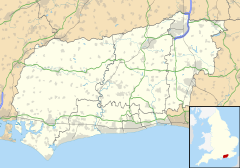Northchapel
| Northchapel | |
|---|---|
 The village centre |
|
| Northchapel shown within West Sussex | |
| Area | 13.62 km2 (5.26 sq mi) |
| Population | 797 2011 Census |
| • Density | 60/km2 (160/sq mi) |
| OS grid reference | SU952295 |
| • London | 38 miles (61 km) NE |
| Civil parish |
|
| District | |
| Shire county | |
| Region | |
| Country | England |
| Sovereign state | United Kingdom |
| Post town | PETWORTH |
| Postcode district | GU28 9 |
| Dialling code | 01428 |
| Police | Sussex |
| Fire | West Sussex |
| Ambulance | South East Coast |
| EU Parliament | South East England |
| UK Parliament | |
| Website | http://northchapel.org/ |
Northchapel is a village and civil parish in Chichester District in West Sussex, England. It stands on the A283 road just south of the Surrey border, around 9 km north of Petworth.
The village is believed to have taken its name from a church which was once a chapelry and was the north chapel of the Manor of Petworth, and originally was two separate words, North and Chapel.
The earliest known human settlement is an iron age camp at Piper's Copse, the only one found on low ground in Sussex. The rampart is over 8 feet (2.4 m) high in places and almost circular, enclosing an area of just over 1-acre (0.40 ha). Iron Age pottery and iron slag have been found on the site. Roman and medieval pottery have also been found at Pipers Copse.
Following the Saxon conquest of Sussex in the late 5th century AD it is likely that the Northchapel area, like much of the wet clay areas of the low weald was used as summer pasture and pannage for pigs by people from Saxon villages along the coastal plain. These summer wood pastures are called "outliers". The ending "fold" in names such as Diddlesfold and Frithfold indicates the presence of animal enclosures for this purpose.
When the Domesday Book was compiled after the Norman Conquest the area did not get mentioned as any separate entity from the Manor of Petworth. There would now have been more permanent settlement with small fields being cleared from forest and bounded by ditches and laid hedges. From the mid-12th century the Manor of Petworth was held by the Percy family, the powerful and often rebellious Earls of Northumberland. These lords had an enclosed deer park at Mitchell Park, then called Micel (great) Park, where records indicate there was a hunting lodge with gardens and orchards. There were two water mills near Colhook, grinding corn. Diddlesfold Manor was given to the Abbey of Reading, and lands near Gospel Green were given to Shulbrede Priory.
...
Wikipedia

